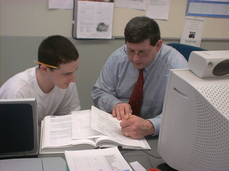Essential Question(s): Why is it necessary to be technologically literate in society, education, and workplace? How do I become technologically literate in society, education, and workplace?
Course Description - Students will learn various technology skills while creating documents, spreadsheets, and presentations. The course is divided into seven units and addresses standards as *listed below, each with a culminating project that allows students to apply the learned skills and a final project where the students create an e-portfolio to exhibit their best work. Business Communications, Career Exploration, and Financial Literacy are embedded throughout the course. The course is designed to accommodate self-directed or classroom instruction.
* Unit 1 - Career Exploration * Unit 2 - Digital Citizenship * Unit 3 - Internet Research w/ MLA Formatting
Unit 4 - MS Word * Unit 5 - MS Excel * Unit 6 - MS PowerPoint * Unit 7 - E-Portfolio
Quizstar
National Educational Technology (NETS) Standards Addressed
2. Communication and Collaboration - Students use digital media and environments to communicate and work collaboratively, including at a distance, to support individual learning and contribute to the learning of others.
3. Research and Information Fluency - Students apply digital tools to gather, evaluate, and use information.
4. Critical thinking, problem solving, and decision making - Students use critical thinking skills to plan and conduct research, manage projects, solve problems, and make informed decisions using appropriate digital tools and resources.
5.Digital citizenship - Students understand human, cultural, and societal issues related to technology and practice legal and ethical behavior.
National Business Education Association (NBEA) Standards Addressed
Career Development
I. Self-Awareness Achievement Standard: Assess personal skills, abilities, and aptitudes and personal strengths and weaknesses as they relate to career exploration and development.
II. Career Research Achievement Standard: Utilize career resources to develop a career information database that includes international career opportunities.
III. Workplace Expectations Achievement Standard: Relate the importance of workplace expectations to career development.
V. School-to-Career Transition Achievement Standard: Develop strategies to make an effective transition from school to career.
VI. Lifelong Learning Achievement Standard: Relate the importance of lifelong learning to career success.
Communication
I. Foundations of Communication Achievement Standard: Communicate in a clear, complete, concise, correct, and courteous manner on personal and professional levels.
IV. Technological Communication Achievement Standard: Use technology to enhance the effectiveness of communication.
Computation
I. Mathematical Foundations Achievement Standard: Apply basic mathematical operations to solve problems.
II. Number Relationships and Operations Achievement Standard: Solve problems involving whole numbers, decimals, fractions, percents, ratios, averages, and proportions.
V. Statistics and Probability Achievement Standard: Analyze and interpret data using common statistical procedures.
* Unit 1 - Career Exploration * Unit 2 - Digital Citizenship * Unit 3 - Internet Research w/ MLA Formatting
Unit 4 - MS Word * Unit 5 - MS Excel * Unit 6 - MS PowerPoint * Unit 7 - E-Portfolio
Quizstar
National Educational Technology (NETS) Standards Addressed
2. Communication and Collaboration - Students use digital media and environments to communicate and work collaboratively, including at a distance, to support individual learning and contribute to the learning of others.
3. Research and Information Fluency - Students apply digital tools to gather, evaluate, and use information.
4. Critical thinking, problem solving, and decision making - Students use critical thinking skills to plan and conduct research, manage projects, solve problems, and make informed decisions using appropriate digital tools and resources.
5.Digital citizenship - Students understand human, cultural, and societal issues related to technology and practice legal and ethical behavior.
National Business Education Association (NBEA) Standards Addressed
Career Development
I. Self-Awareness Achievement Standard: Assess personal skills, abilities, and aptitudes and personal strengths and weaknesses as they relate to career exploration and development.
II. Career Research Achievement Standard: Utilize career resources to develop a career information database that includes international career opportunities.
III. Workplace Expectations Achievement Standard: Relate the importance of workplace expectations to career development.
V. School-to-Career Transition Achievement Standard: Develop strategies to make an effective transition from school to career.
VI. Lifelong Learning Achievement Standard: Relate the importance of lifelong learning to career success.
Communication
I. Foundations of Communication Achievement Standard: Communicate in a clear, complete, concise, correct, and courteous manner on personal and professional levels.
IV. Technological Communication Achievement Standard: Use technology to enhance the effectiveness of communication.
Computation
I. Mathematical Foundations Achievement Standard: Apply basic mathematical operations to solve problems.
II. Number Relationships and Operations Achievement Standard: Solve problems involving whole numbers, decimals, fractions, percents, ratios, averages, and proportions.
V. Statistics and Probability Achievement Standard: Analyze and interpret data using common statistical procedures.

